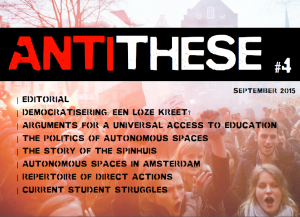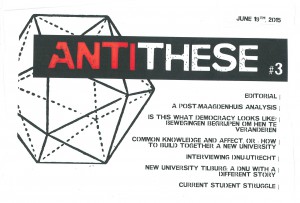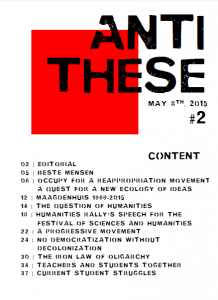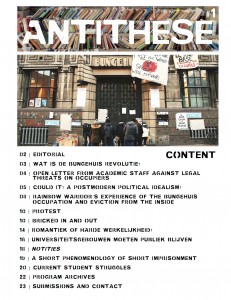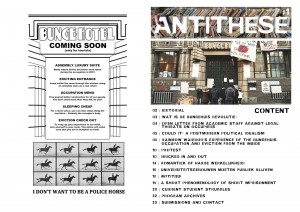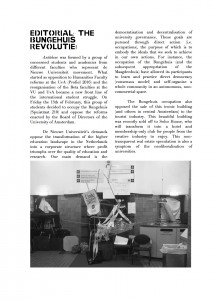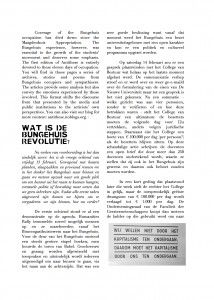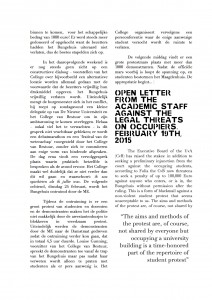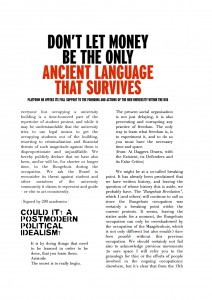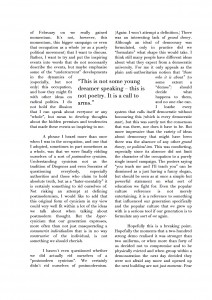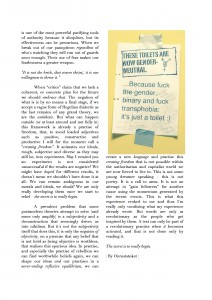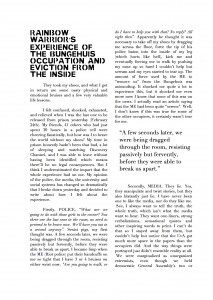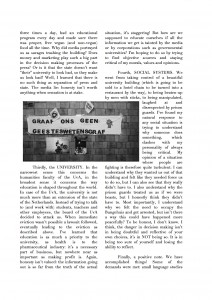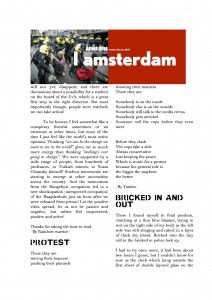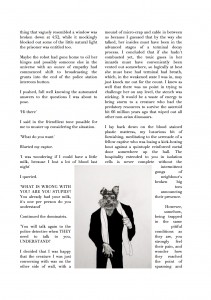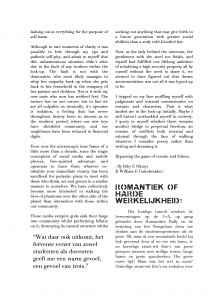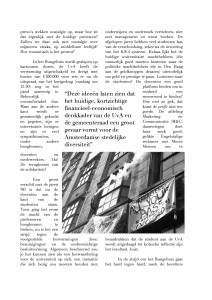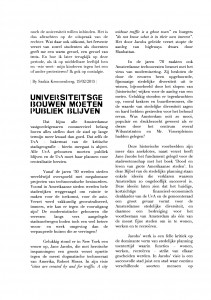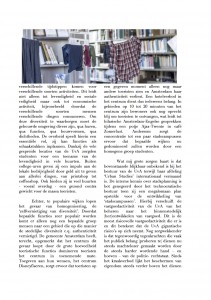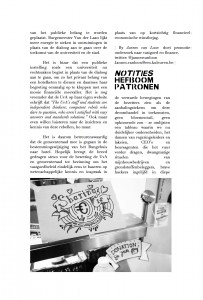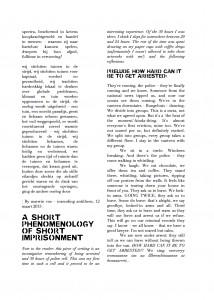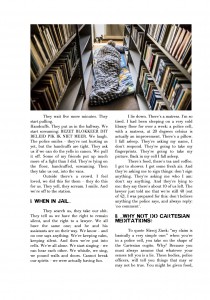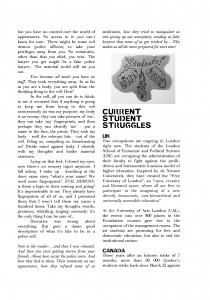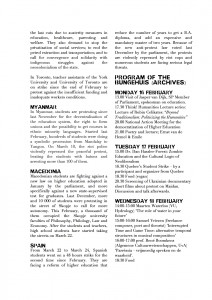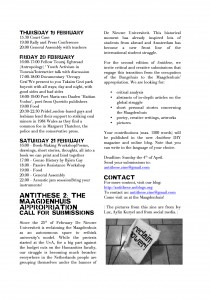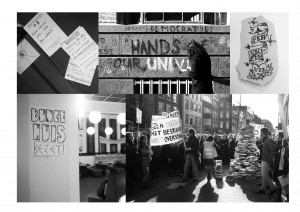Beste actievoerende Amsterdamse academici,
Jullie hebben je de afgelopen tijd verenigd in bewegingen (Humanities Rally, De Nieuwe Universiteit, Rethink UvA), meerdere keren gedemonstreerd, alsook het College van Bestuur (CvB) geconfronteerd met een aantal eisen die betrekking hebben op de organisatie van de Universiteit van Amsterdam (UvA). Dat betekent dat er een cultuuromslag in die organisatie dient te komen: bestuur moet op een zo laag mogelijk niveau plaatsvinden. Tegelijkertijd problematiseren jullie niet de hoge mate van institutionalisering, oftewel formalisering, binnen de universiteit. De afgelopen maanden hebben jullie vooral aangetoond dat de gewenste verandering wordt gebracht met het aankaarten van problemen. Er zijn echter – niet alleen aan de UvA, niet alleen binnen het hoger onderwijs, niet alleen in Nederlandse instituties – vele verbonden problemen, maar welke daarvan heeft jullie grote energie eigenlijk aangewakkerd?
In oktober 2014 werd De Nieuwe Universiteit opgezet, en na de aankondiging van bezuinigingen binnen de geesteswetenschappen aan de UvA (FGw) in november ontstond ook Humanities Rally (HR) als studentencollectief van studenten van de FGw. In beginne was het voor HR volstrekt onduidelijk waar de financiële problematiek precies vandaan kwam. Tegelijkertijd meende het faculteitsbestuur al in overleg met verschillende partijen over mogelijke oplossingen te hebben gesproken. Binnen HR werd vervolgens in kleinere taakgroepen hard gewerkt, er kwam een machine op gang. Telkens werd geprobeerd het gesprek met het bestuur van de FGw aan te gaan; steeds bleek informatie nog ontbrekend. Daarom werden beleidsstukken boven water gehaald en bestudeerd, en werden er over de inhoud van die stukken, alsook over de voortgang van het dialoog – of het gebrek eraan – opiniestukken geschreven. Op facultair, universitair en landelijk niveau leken alle rechtvaardigingen voor de door de bestuurders beoogde veranderingen voort te komen uit “het rendementsdenken”, alsof de universiteit beoordeeld en bestuurd zou kunnen worden op basis van enkel kwantitatief meetbare factoren en financiële rendabiliteit. De uitdaging was allereerst echter om te tonen hoe dit idee zich in de praktijken binnen de FGw actualiseerde. Het ministerie betaalt universiteiten per op tijd afgestudeerde student; opleidingen met weinig studenten zijn daardoor niet rendabel. Het financieel verdelingsmodel was en is allesbehalve onproblematisch. Aan de FGw hadden tot slot veel minder eerstejaars studenten zich ingeschreven, en er viel daardoor een gat in de begroting. De decaan stelde daarom voor om de FGw ofwel om te vormen tot een “liberal arts college”, ofwel een eerste jaar als “brede bachelor” op te zetten voor alle geesteswetenschappen.
Na een paar maanden waarin discussie op niets uit zou lopen, waarin bestuurders naar elkaar zouden blijven wijzen wat betreft hun verantwoordelijkheden, werd er, nu ook met steun van studenten van andere faculteiten en universiteiten, steeds meer een pleidooi gehouden voor openheid van de kant van het bestuur van de UvA. Op 13 februari 2015 bezette De Nieuwe Universiteit ’s ochtends het Bungehuis, en ’s middags sloten sommigen van Humanities Rally zich na een nieuwe protestactie bij hen aan. Eis van de bezetters: stopzetting van bezuinigingsplannen, het aftreden van en referenda voor het universiteitsbestuur, en medezeggenschap in de faculteiten. Niet iedereen deelde dit verlangen naar radicale verandering. Maar nadat het Louise Gunning namens het CvB in een kort geding eiste dat de bezetters op straffe van een dwangsom van 100.000 euro per bezetter per dag zouden vertrekken en zo de burgerlijke ongehoorzaamheid criminaliseerde, en in Nieuwsuur verkondigde dat slechts “een kleine groep studenten” de Bungehuisbezetting steunde, volgden er vanuit vele docenten en verschillende maatschappelijke groepen uit het hele land juist steunbetuigingen aan het adres van de bezetters. Op 24 februari werd het Bungehuis ontruimd, en de volgende dag protesteerden ongeveer 1500 studenten, docenten en sympathisanten naar het Maagdenhuis, waar actievoerders na een uur de deur openschopten. Sinds 25 februari wordt met horten en stoten het gebouw als publieke ruimte toegeëigend en zijn er verschillende lezingen en evenementen georganiseerd. Er zijn vervolgens door DNU, HR en Rethink verschillende eisen opgesteld, waaronder democratisering van organisatie, decentralisatie door besluitvorming op een zo laag mogelijk niveau van organisatie, en het bieden van zo veel mogelijk vaste aanstellingen aan docenten. Het CvB heeft in reactie op de gebeurtenissen en op deze eisen gereageerd met een 10-puntenplan m.b.t. het bestuur en de institutionele cultuur aan de UvA. Met haar reactie wekte het CvB de indruk een flinke omslag te hebben gemaakt, en een handreiking te doen naar de academische gemeenschap. Echter, de punten werden te abstract bevonden, en alsnog zou het aan de academische gemeenschap zijn om de universiteitscultuur te veranderen. Ondertussen lijkt de toeëigening van het Maagdenhuis tegen z’n einde te lopen. Humanities Rally gaat opnieuw in gesprek met de decaan van het FGw. Andere faculteiten herorganiseren zich ook. En Rethink UvA blijft in gesprek met het CvB. Kortom: men stuurt aan op concrete veranderingen binnen de bestaande onderwijsstructuur, die allereerst maar eens formeel moeten worden vastgelegd.
Al die actie, voor wat? Voor meer… (1) democratisering, (2) decentralisatie en (3) zekerheid van contracten? Hoe kun je daarmee niet alleen de voorgestelde bezuinigingen van tafel krijgen en de bestuurscultuur veranderen, maar óók de financialisering, de vastgoedprojecten en verdere bureaucratisering tegengaan? Het lijkt mij dat je, hoe concreet je die drie eisen ook maakt, je (1) alsnog aanstuurt op formalisatie, op verdere institutionalisering, en (2) alsnog volledig instemt met de wensen van de de competitie binnen en tussen universiteiten, en aan de financiële eisen die aan de universiteit worden gesteld. Moeten we terug de institutie, de universiteit in, het vertrouwen in de top van het hiërarchisch georganiseerde geheel herstellen, en weer aan de slag? Of kunnen jullie aantonen dat jullie horizontale vorm van organisatie levensvatbaar is, en steeds weer laten zien dat een dergelijk bij de praktijk betrokken, egalitaire organisatievorm noodzakelijk is voor de gezondheid van het hoger onderwijs?
Hoe bestuur (gedeeltelijk) te deïnstitutionaliseren? Gaan democratie, bureaucratisering en institutionalisering niet juist hand in hand? Zouden we de aandacht niet moeten verleggen naar horizontale organisatie van groepen die anders leven, die begrijpen dat er verschillende vormen van kennis zijn, en die van ieder altijd al de capaciteit om sociaal problematische ideeën te bespreken toekent?
Enkele kanttekeningen bij de notie van bureaucratisering, zoals David Graeber het op 7 maart in het Maagdenhuis besprak. Graeber beschouwt bureaucratie als de schakel tussen de markt (“privé”) en de staat (“publiek”); het fuseert nationaal bestuur en de macht van bedrijven. Na jaren van opbouw van verschillende verzorgingsstaten nemen natiestaten nu steeds vaker op directe wijze, door middel van bureaucratische middelen, het welzijn juist (weer) af van de individuen die zij gedeeltelijk hebben geproduceerd. In Nederland wordt de economie wellicht niet voor 80% gedreven door financiën en vastgoed, maar het is wel duidelijk dat het in steeds grotere mate onze verschillende manieren van leven probeert aan te tasten. In Amsterdam wordt al het niet-economische leven verwijderd uit het centrum; het wordt een gebied van toerisme, financiën, en vastgoed. Ieder wordt geacht zich als consument te beschouwen, wordt gedreven om producten te kopen en om te investeren in bedrijven en hun producten; ondertussen is het normaal dat iedereen een schuld opbouwt. Het verschil tussen de staat, markt en maatschappelijk middenveld is volledig verdwenen; kapitaal circuleert en regeert, het investeert in zichzelf, schulden maken ons meester.
Jullie vormen precies een vorm van organisatie, een in de praktijk strijdende organisatievorm die dit soort circulatie en sturing van kapitaal en verlangens kan blokkeren. We leven niet in een perfecte disciplinerende samenleving. In het proces van institutionalisering, van formalisering, van de productie van zekerheid, gaat ook een hoop mis. Niet langer zijn het niet-economische codes, bv. van reproductie, die de verlangens van een bevolking, een gemeenschap of groep sturen. Instanties verwijzen nu naar mathematische wetten, naar axioma’s, wiens sturende kracht als vanzelfsprekend worden geacht. Ieder verkoopt zijn arbeidskracht, aan een bedrijf, aan de staat, aan een institutie, of als zelfstandig ondernemer – en wordt zo alsnog een onderdeel van de maatschappelijke machine. We accepteren de axioma’s als vanzelfsprekend: onze privé-existentie, onze overtuigingen, gedachten en verlangens, vormen in steeds grotere mate een “privatisering” van de publieke onderwerping en subjectivering. In de realisatie van het kapitalisme participeren we dus, maar de bevrijding van normen, van codes, creëert ook genoeg problematische situaties.
Gesteld dat (1) op allerlei niveaus voortdurend verlangens worden geproduceerd, (2) verschillende uitingen van macht er juist het historisch contingente resultaat van zijn, (3) op ieder discours een ander volgt dat het voorgaande problematiseert, en misschien wel idioot doet lijken, (4) men beter niet kan hopen op een grote revolutie… is het niet zaak het ongelijk van marxisten en heideggerianen op het punt van de massa aan te tonen en telkens te laten zien dat collectieven het vermogen hebben om vragen te stellen en problemen uit te lichten? Er gaat veel fout; is het niet de affirmatie van problemen die ons als veranderlijk collectief sterkt, en die op een vruchtbare manier weet af te wijken naar de “zoektocht” naar al vooraf gedefinieerde, al bestaande oplossingen?
Jullie strijden lichamelijk, driftig, met affectie én verstand, en kaarten herhaaldelijk de specifieke problemen van de kapitalistische axiomatiek aan. Dat kan iedereen in collectief verband, en zo’n praktijk zelf kan onmogelijk geformaliseerd of geïnstitutionaliseerd worden.
Gertjan Buijs (masterstudent filosofie aan Université Paris-8)
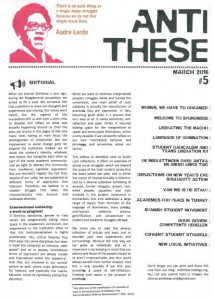 Printable version : antithese5
Printable version : antithese5
